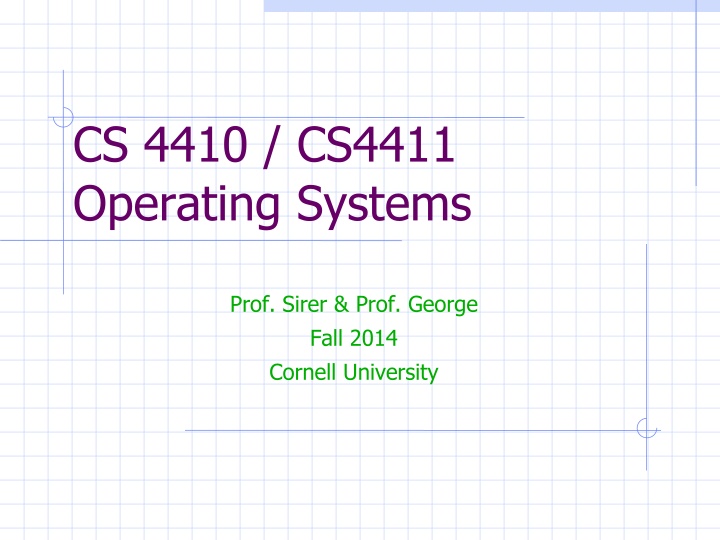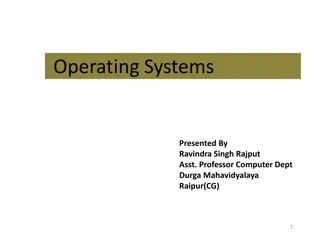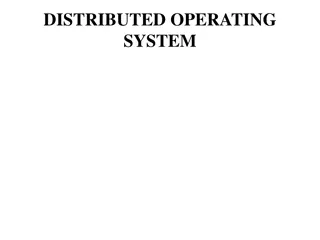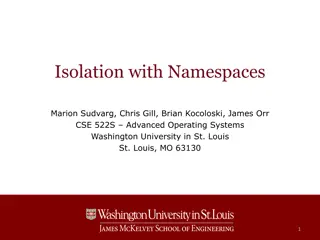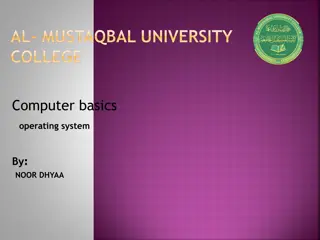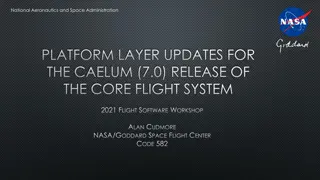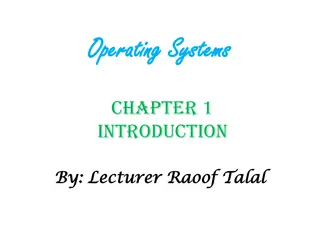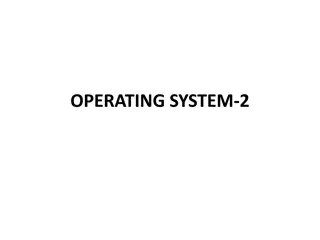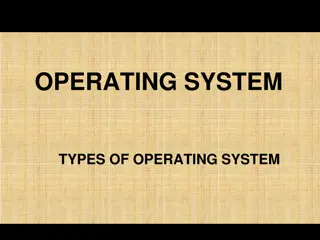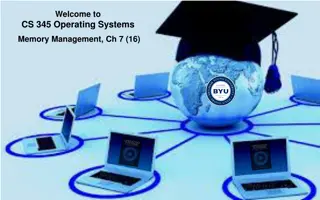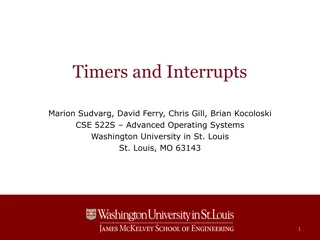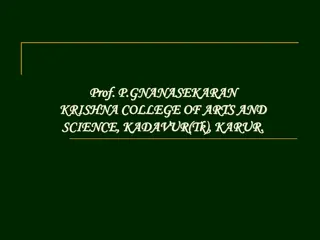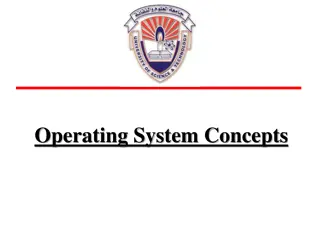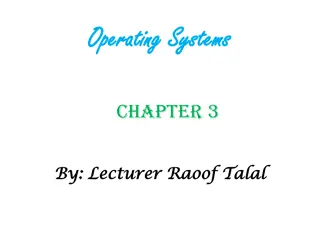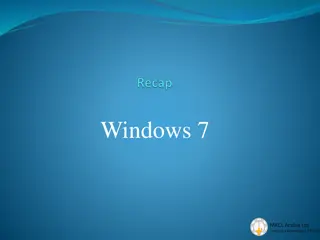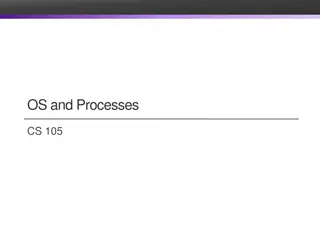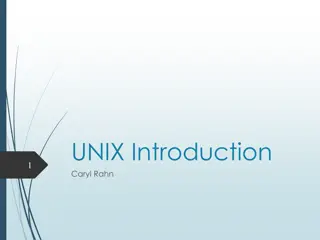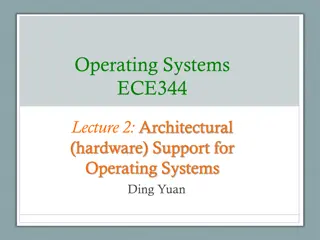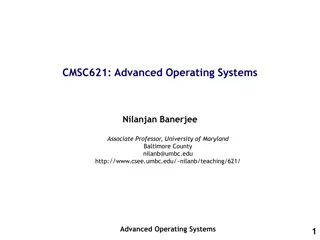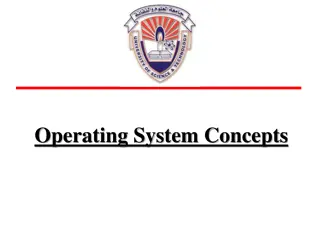CS 4410 / CS4411 Operating Systems
This course delves into the architecture of operating systems, emphasizing software design principles. It covers foundational concepts, system components, resource management, and design patterns, aiming to build a solid programming foundation and understanding of complex software systems.
Uploaded on Feb 21, 2025 | 1 Views
Download Presentation

Please find below an Image/Link to download the presentation.
The content on the website is provided AS IS for your information and personal use only. It may not be sold, licensed, or shared on other websites without obtaining consent from the author.If you encounter any issues during the download, it is possible that the publisher has removed the file from their server.
You are allowed to download the files provided on this website for personal or commercial use, subject to the condition that they are used lawfully. All files are the property of their respective owners.
The content on the website is provided AS IS for your information and personal use only. It may not be sold, licensed, or shared on other websites without obtaining consent from the author.
E N D
Presentation Transcript
CS 4410 / CS4411 Operating Systems Prof. Sirer & Prof. George Fall 2014 Cornell University
Whats This Course About? Ostensibly, it s about operating systems architecting complex software identifying needs and priorities separating concerns implementing artifacts with desired properties It s really about software design principles It just so happens that OSes illustrate organizational principles and design patterns
What Kind of a Course Is This? Constructive, top-down We start from first principles and re-derive the design of every component of a complex system Deconstructive, bottom-up We dissect existing systems, learn what tradeoffs they make, what patterns they use
Course Objective Establish a foundation for building complex programs Architect systems Identify desirable properties Build large systems Debug complex systems Understand all layers of the software stack between hardware and applications 4
What is an Operating System? An operating system (OS) provides a virtual execution environment on top of hardware that is more convenient than the raw hardware interface All of the code you did not write Applications Simpler More reliable Operating System More secure More portable Hardware More efficient
What do OSes do? Manage physical resources Provide virtual resources Implement mechanisms and enforce policies to arbitrate access to resources Mediate the interaction of mutually distrusting applications Provide an extensible, general-purpose platform for a variety of applications
What Resources Do OSes Control? Physical Resources CPU, memory, disks, networks, I/O devices, Virtual Resources Files, directories, sockets, names,
Issues in OS Design Structure: how is an OS organized? Concurrency: how are parallel activities created and controlled? Sharing: how are resources shared? Naming: how are resources named by users? Protection: how are distrusting parties protected from each other? Security: how to authenticate, authorize and ensure privacy? Performance: why is it so slow?
More Issues Reliability: how do we deal with failures? Extensibility: how do we add new features? Communication: how do we exchange information? Scale: what happens as demands increase? Persistence: how do we make information outlast the processes that created it? Accounting: who pays the bills and how do we control resource usage?
Why Learn Operating Systems? At most 1% of software developers will work on OS code The material taught in this course is critical not just for building Oses, but for building correct, high- performance applications (clients of Oses), as well as building reusable platforms for others This course will go far beyond OS design to cover all aspects of computer organization, including concurrency, synchronization, input/output, filesystems, networking, routing, distributed systems and so forth Engineering pride alone requires full understanding
Fact There has never been as exciting a time to work on systems hardware and software as now!!! The world is increasingly dependent on computer systems Connected, networked, interlinked People just do not know how to build robust systems
Therac-25 A safety-critical system with software interlocks Beam controlled entirely through a custom OS
Therac-25 Old system used a hardware interlock A lever that could either be in the zap or x-ray position New system was computer controlled A synchronization failure was triggered when competent nurses used the back arrow to change the data on the screen too quickly
Therac-25 Outcome Beam killed one person directly, burned others, and may have given inadequate treatment to cancer patients Problem was very difficult to diagnose; initial fix involved removal of the back arrow key from the keyboard People died because a programmer could not write correct code for a concurrent system
Denver airport The most modern, most expensive airport in recent history Cost overrun in excess of $2B Highly automated luggage handling system was supposed to deliver your luggage to you at arrival Lack of persistence caused luggage carts to forget their contents, sprinkling the luggage on the runway
USS Yorktown Modern guided missile cruiser off of Norfolk, VA in 1998 Crew member entered 0 for a data value Cascade of failures led to a failure of the propulsion system Yorktown was dead in the water for a couple of hours
Bitcoin Banks There is a new crop of systems for holding data known as NoSQL databases We cautioned about the errors people were committing with NoSQL systems The simplest attack against banks, of simultaneous withdrawals, actually works! Attackers stole millions of dollars from Bitcoin banks One bank lost a million and folded Another lost $500K, took losses
Other Systems FAA air traffic control system IRS data management system IBM Microkernel Pentagon data security Many others, too numerous to list
Summary We do not have the necessary technologies and know-how to build robust computer systems There is huge demand for people who deeply understand and can build robust systems
Philosophy Not your grandfathe s OS course We believe that the following topics are critical for every software engineer Building concurrent systems Architecting networked components Building transactional systems Not widely shared, the course is unique
Logistics Lectures Tuesday, Thursday 2:55-4:10pm, Ives 305 Instructor Prof. Sirer, egs at systems.cs.cornell.edu Prof. George, mdgeorge at cs.cornell.edu Office Hours Prof. Sirer: Tuesday 4:10-5:10pm Prof. George: Thursday 4:10-5:10pm TAs
Communication Course Web Page Office hours, assignments, lectures, and other supplemental materials will be on the web site Email cs4410staff at systems.cs.cornell.edu The email alias goes to us and the TAs, not to the whole class
Administrative Course has three components Lectures and Readings Exams Projects and MiniProjects Textbook Anderson and Dahlin XXX You are expected to keep up with all three
Grading CS4410 Breakdown ~40% MiniProjects ~12% Prelim 1 ~18% Prelim 2 ~25% Final ~5% Flexgrade (participation, attitude, effort) CS4411 Breakdown ~90% Projects ~10% Flexgrade Grading will not be done on a curve It is our goal to be able to give everyone an A+ Help us achieve this
Projects in CS4411 Projects will be done in two-person teams You may indicate a desired partner If they also indicate you, we will pair you up If you don t have a preferred partner, we ll pair you up with someone suitable Working in groups Start early, time management is key Manage the team effort Part of what you are supposed to learn is how to manage to get work done in a small team
MiniProjects in 4410 There will be approximately 4-6 miniprojects MiniProjects will be done individually Working individually Start early, time management is key
Academic Integrity and Honor Code All submitted work must be your own All homeworks must be your own independent work OK to study together Cannot share solutions, ever Project groups submit joint work All group assignments must represent solely the work of the two people in that group Cannot be in possession of someone else s solution Violations will be prosecuted to the fullest extent Closed-book exams, no calculators
Our Expectations Code of Silence Absolute quiet during lectures If you have a question, please speak up Chances are 100% that someone else has the same question No electronics, Luddite zone Scientific studies show that such classrooms are far more effective
Enrollment SNAFU There is great demand for CS courses in general, this course in particular The department has decided that the only way to manage the demand is to award the limited slots according to need I was not consulted during the capping process I did not implement the caps Having said that, I don t know of any other way to manage the demand There was an error where the caps were set wrong, as result, some people who enrolled in April had to be unenrolled The instructors had nothing to do with this!
Enrollments If you are enrolled now, congrats! If you decide to drop the course, please do so promptly so others can step in! If you re not yet enrolled yet, you need to place your name on a department-managed waitlist The department, not the instructors, will triage the waitlist and send enrollment PINs
Prerequisite CS3410 or equivalent required. Or permission of instructor. Required means required. If you did not take CS3410 or equivalent, you must contact course staff, explain your situation and request permission.
Draft Syllabus Introduction Architectural Support for Operating Systems Processes and Threads Scheduling Synchronization, Mutual Exclusion, Spin Locks, Semaphores, Condition Variables Deadlocks, Detection and Avoidance Memory Management Networking, LANs, WANs, Ethernet, ARP, IP, UDP, TCP Disks and RAID Filesystems, UFS, LFS Security
Draft Project Plan for CS4411 Threads and Concurrency Scheduling Basic Datagram Networking Reliable Streaming Protocols Routing Filesystems
About Prof. Sirer Interests: OSes, distributed systems, self-organizing and peer-to-peer systems Bitcoin, flaws within, fixes to Sailing, wind, sea, woodworking (aka body modification)
About Prof. George Cornell grad student through 2013, lecturer since 2013 Took 4410 a decade ago! Interested in designing and building systems and reasoning about code. Just taught 4410 over the summer
Questions? And demographics
